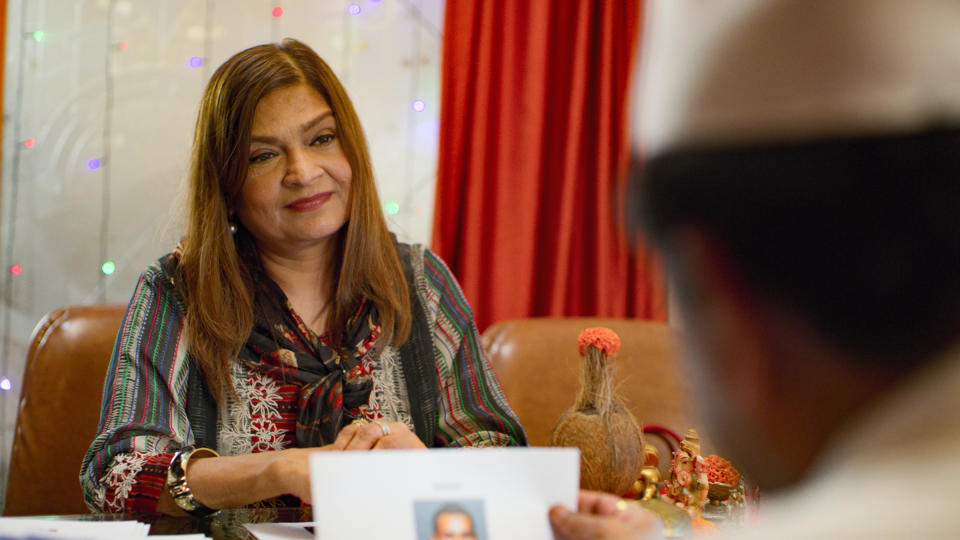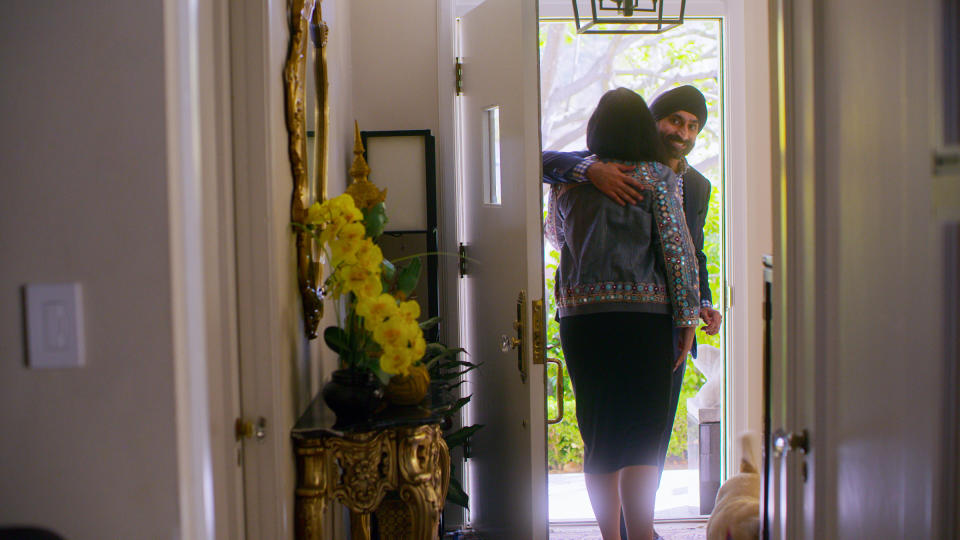New Season, Same Problems: Here’s How Indian Matchmaking Can Improve For Season 3

Sima Taparia in Season 2 of Indian Credit - Courtesy of Netflix
Indian Matchmaking—a show some people love, and others love to hate—is back. And after generating plenty of controversy and debate among viewers in the series’ first season, which helped to make the show very popular, its creators do not seem to have learned from their mistakes. The Netflix show, still built around matchmaker Sima Taparia in its second season, reflects some of the problematic aspects of the matchmaking industry, from casteism to heteronormativity, sexism to colorism and classism, but it fails to make much effort to question them.
Although season 1 received much criticism, many viewers appreciated that it opened a window into what present-day matchmaking can look like and were entertained by the cast members and their journeys. From Pradhyuman’s liquid nitrogen foxnuts to Akshay’s mother’s blood pressure, fans enjoyed seeing the ridiculous behaviors of Sima’s ultra-rich clients, and also related to the emotional journeys of cast members like Vyasar, Ankita, and Nadia.
But for a show that is supposed to offer a modern look at this process, its first season showed Sima representing some of the most regressive parts of the industry, with veiled references to caste, declarations that people are looking for “slim, trim, tall and fair” girls, and careless remarks like “if females are lawyers in India, people are scared.” Even if Sima’s views reflect the reality for many families going through the matchmaking process, these harmful and flippant comments were problematic because the show allowed them to be presented without question. In season 2, we continue to see Indian culture through a limiting lens that focuses on the stories of affluent, fair, and upper-caste North Indians. Although it features a new cast, the episodes offer more of the same.
A single docuseries can’t offer a fully comprehensive view of a country or a culture. But despite the constructive criticism season 1 received, season 2 continues many of the first season’s mistakes. The show has already been renewed for a third season, which will focus on matchmaking in the U.K. Here are four ways in which Indian Matchmaking can improve for season 3.
Read more: Netflix’s Indian Matchmaking Is Bringing Painful Conversations to the Fore. But Is It More Helpful or Harmful?
Reflect a more modern version of matchmaking

In season 2, we continue to follow Sima Taparia, a matchmaker whose appearance on the show has prompted criticism over what viewers perceive as her prejudice and double standards. Although she describes herself as “Mumbai’s top matchmaker,” she had no success with matching clients from last season and represents a traditional way of matchmaking, continually telling her clients to be patient, compromise, and be prepared to receive only 60 to 70% of what they’re looking for, even though many don’t want to settle down until they find the right partner.
Season 2 introduces five new cast members: Akshay, Viral, Arshneel, Shital, and Vinesh, all of whom have high expectations for their partners but don’t seem to learn much from the matchmaking process. We do, however, see personal growth and hopeful outlooks from returning cast members Nadia, Aparna, and Pradhyuman.
In many ways, season 2 offers a more realistic and relatable view of modern dating—from bad first dates to cultural differences to constant excuses that there was “no spark.” For a show about arranged marriage, this season’s storylines took a lot of pressure off the outcome of marriage and more broadly explored what it means to try to find someone who can understand you while learning about yourself in the process.
Read more: Here’s Everything New on Netflix in August 2022—and What’s Leaving
But, in several moments, the show continued to feel as old-fashioned as its matchmaker. Sima Auntie hasn’t changed; she still “only work[s] with high-profile clients”, as she told Condé Nast Traveller India, and still tells them that “you have to adjust” so you will “get results.” Season 2 starts with Sima explaining that “first is marriage, then love” and “everything gets adjusted after marriage,” but the cast is more interested in making sure they feel secure with themselves and confident in their relationships before marriage. Many find partners despite Sima, not because of her, which makes one wonder why the show is still centered around her. It was refreshing to see cast members decide whether or not they wanted to follow Sima’s advice, but her presence on the show and her traditional client roster prevent it from featuring a more diverse cast.
The season feels most relatable when crowd favorites Aparna Shewakramani and Nadia Jagessar open up about the difficult process of finding a life partner. After rejecting Shekhar and in turn being dumped by Vishal because of that aforementioned lack of a spark, Nadia feels disillusioned by love but says that she “can’t lose hope” and will keep trying. Aparna’s story focuses on her move to New York and the process of finding her footing in a new city. By parting ways with Sima, Aparna tells TIME, “I got to live my matchmaking experience on my own terms.” She meets someone new called Daman, but questions their compatibility and ultimately decides to take time for herself. She shares with TIME that “the happiness had to come from me, and the ultimate love story had to be the one I had with myself…I was always making space for [my future partner] by loving myself.” Their choices show that they would rather be single than be with a partner who wasn’t the right fit. By spending more time exploring self-love and self-discovery in the matchmaking process, the show can more accurately reflect modern dating.
Stop perpetuating double standards

When season 1 was released, many people noticed that Sima treats her male and female clients differently. For example, she called Aparna “picky” and “stubborn” for saying no to her first match but was endlessly patient with Pradhyuman, who rejected 150 marriage proposals.
In season 2, the double standards continue. Sima says Akshay, an engineer from Nashik who describes himself as the “world’s most eligible bachelor,” is “charming, handsome. Parents are good. He’s loaded with money.” But when she’s describing Viral, who works in the pharmaceutical industry, she says “Viral is very calculative [because] she gave lots of preferences and criterias.” When Akshay is having trouble finding a match, Sima explains, “There is some defect in the horoscope, and so he refuses every girl who comes to meet him,” but when Shital, a business development manager in New York, is hesitant over whether to meet with a potential match, Sima says that “she always looks for a reason to find [that] someone is not perfect.” She criticizes women for turning down any proposals, but excuses men when they do the same.
This also affects how she manages her clients. She gives Viral and Shital one biodata at a time, saying “that’s my way of working” and that “Shital is a picky person, so she gets confused very fast,” but gives Arshneel, a cardiologist from Cleveland, a choice between three women and Vinesh from Miami a choice between two. Although Sima recognizes that “the girls have to compromise and the boys have to compromise,” she can work on applying this to treating her clients equally—or the show could recast her with a matchmaker who does.
Read why Indian Matchmaking is on TIME’s list of the 50 Most Influential Seasons of Reality TV
Diversify casting choices

The show features rich, upper-caste Hindu and Sikh North Indians (Gujaratis, Punjabis, and Sindhis), even though there is a much greater diversity of culture within India. Many of the cast members have cultural preferences and look for a partner from the same community and background. Sima Auntie even encourages this ethnocentrism by choosing matches for her clients with similar cultural and religious backgrounds, careers, and hobbies.
In episode 6, she claims that Arshneel and Rinkle would make a good match because “both are doctors. The habits, the staying, the eating, the thoughts and all, they match each other.” When Viral is asked about her criteria, she says she wants a Gujarati Hindu partner who is fluent in the language. “I do identify as Hindu. I know it would make my parents happy to just keep it all the same.” Although everyone has preferences, it can be frustrating to see ethnocentrism in action, especially when it comes to cast members like Vinesh who says he “wants a traditional Indian girl” who makes pakoras like his mom.
In season 1, the show featured a global look at matchmaking, with three of Sima’s clients in India and five in America. But season 2 only includes one new client from India, Akshay, and the rest of the cast members are Indian American. Hopefully, in season 3, we’ll see some more inclusive casting choices that more thoughtfully represent the British Indian community.
Read More: Reality TV Has Reshaped Our World, Whether We Like It or Not
Have difficult conversations

By adding more nuance, the show could explain complicated topics and traditions in Indian culture, but for two seasons now, its creators have chosen not to. Akshay is told that he is having trouble getting married because he has the Vivah Bandhan curse, and he schedules a puja to remove obstacles, but the cultural tradition behind this is never fully explained.
Arshneel is apprehensive that his first match Anjali has never dated an Indian before, but also feels hesitant about Rinkle, since he’s never dated anyone who grew up in India and is worried that there will be “potential cultural differences.” As a Sikh man who wears a turban, he often wonders if girls who aren’t Punjabi or Sikh will accept his background.
Although colorism was a big issue in season 1, with Sima’s new client Richa saying she wants someone who is “not too dark, you know, fair-skinned,” it’s never explicitly addressed in season 2, although the matches Sima picks for her clients are generally fair. By avoiding the topic, the show normalizes the practice.
Indian Matchmaking can be entertaining to watch, but misses many opportunities to explore topics that viewers could relate to or learn from. The popularity of the show reveals that people are eager to have these conversations, if only we could go a little deeper.

